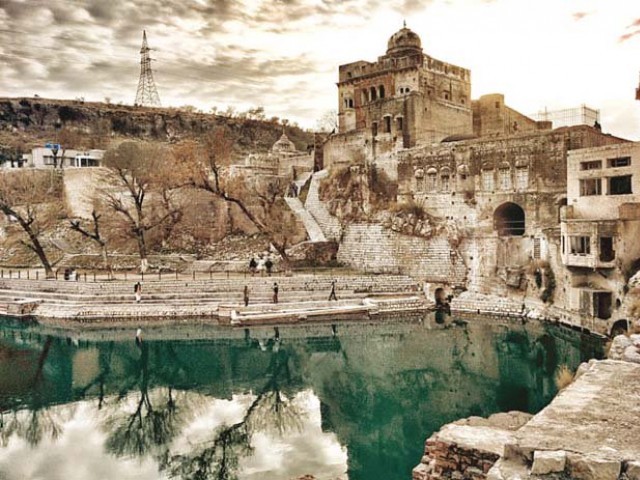
The CJP issued these remarks during the hearing of a suo motu case of the fabled Katas Raj Temples' pond drying up because of the area's subsoil water being used by nearby industrial plants.
The pre-historic fabled pond is said to be drying out because of huge amount of water consumption in cement factories which are reportedly sucking water through more than hundred drill bores, severely reducing the subsoil water level.
That is beside the position that owing to the absence of proper water supply for the local areas of Katas Waulah and city Choa Saidan Shah, almost all residential houses are sucking the water by boring. The problem is worsened by unreasonable plantation of eucalyptus trees in the region.
Top court seeks report on fabled Katas Raj Temples' pond drying up
During the proceeding, a three-judge bench of the apex court, issued notices to all the factories situated in the area beside seeking a report from the Punjab government regarding the steps taken to overcome the water supply issue.
The bench was informed that the provincial government had formed two committees to examine the environment and water issues in the area.
Meanwhile, the top court also took strong exception over the alleged mismanagement of the Evacuee Trust Property Board, issuing orders for its chairman to appear on the next date of hearing.
A Pakistan Muslim League-Nawaz (PML-N) lawmaker, Dr Ramesh Kumar, alleged that the role of the board’s chairman was dubious as despite ending of his tenure the chairman was still occupying the post. He also informed the apex court that the board did not provide any jobs to the Hindus.
Pakistan unveils 1700-year-old sleeping Buddha, evoking diverse heritage
The bench asked the MNA to submit his grievances in black and white and sought a comprehensive report from the chairman of the Evacuee Trust Property Board regarding its properties and details of litigations.
Dedicated to Hindu god Shiva, the Katas Raj temples are situated near Choa Saidan Shah in the Chakwal district of Punjab. The site originally housed a cluster of seven ancient temples, along with a Buddhist stupa and the home of a warrior — built between 6th and 13th century.
Legend has it the pond was formed by the tears shed by Shiva over the death of his wife Sati. Hindu pilgrims from around the world visit the Katas Raj temples during the Maha Shivratri festival and bathe in the ‘sacred pond’ to seek forgiveness. Some believe the water holds healing powers.

1721377568-0/BeFunky-collage-(18)1721377568-0-165x106.webp)



1725254039-0/Untitled-design-(24)1725254039-0-270x192.webp)

1732617223-0/Untitled-design-(69)1732617223-0-270x192.webp)

1732603037-0/BeFunk_§_]__-(51)1732603037-0.jpg)
1732610150-0/Untitled-design-(3)1732610150-0-270x192.webp)






COMMENTS
Comments are moderated and generally will be posted if they are on-topic and not abusive.
For more information, please see our Comments FAQ